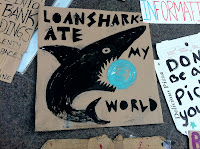I'll be blogging about Covey's legacy elsewhere in the next day or so, but wanted to reflect on the firewalk injuries today.
.jpg) |
| Sri Lankan firewalk courtesy Wikimedia (full credit below) |
Although the firewalk coals are hot, certain rocks (particularly volcanic rocks used in the Fijian version of the firewalk) have very low (and slow) heat conductivity. If the approach to the firewalk is across, say, wet grass, the water on the soles of the feet and the slow conductivity of the embers allows for a few moments of insulation before injuries can occur. If the coal beds are still smoldering, but cooling, and the grass or other approach is wet, and the participants move fairly quickly across the beds, then typically injury is averted. And people leave exhilarated – pumped up on adrenaline – at having conquered the understandable fear of fire.
Covey's team asserts that over 6,000 people attended Robbins' four day event and only 21 were injured. There are, however, no figures on how many of the workshop attendees actually engaged in the firewalk. Robbins' team goes on to claim that they've been doing these events for 30 years without significant injury.
So what happened this time?
We don't know, and we'll probably never know, as there will be no police investigation. The self-help industry is as unregulated as were the patent medicine peddlers of the early 20th century.
The most likely scenario is that one of the firewalk pits wasn't prepared correctly. Either the embers had not begun cooling, or the approach wasn't wet enough. Or someone slowed down or stumbled and that led to a chain reaction of slowing that kept people on the coals too long. Robbins' team will very likely be investigating this for themselves, very closely.
But what's remarkable, and instructive to observe, is how the injuries have been explained by firewalk participants. One was quoted in the New York Times as saying that the injured must have been "out of state" – Robbins' language for not being in the proper frame of mind to conquer challenges. One injured woman showed up at the final day of the seminar blaming herself, and saying, incredibly, "I'm glad I felt the pain." Even the Times article minimized the seriousness of third degree burns for which some were hospitalized, calling the the injuries "blisters."
What's going on here is precisely the psychology that plays out in a meritocracy: if you succeed, it's all to your credit and had nothing to do with the circumstances or opportunities available to you. In this case the circumstances would be a properly prepared and monitored fire walk pit for some, and not for others.
Reciprocally, if you fail, it's your own fault and you deserve the consequences. In this case, serious burn injuries for several participants who are shamed into blaming themselves instead of holding Robbins' and his team accountable.
This sort of "glad it weren't me" used to be explained with expression like "there but for the grace of God go I." Now we're more likely to say some unspoken (since boorish) revision: "there but for my own personal merits or mind power go I." It's hard to say which version of self-satisfaction is more smug.
In the midst of this self-satisfaction, the injured serve an important role. They become the living proof that the firewalk was a dangerous feat, and thus that walking over a bed of hot coals without injury is some sort of laudable accomplishment.
Fortunately, the 21 people injured at the Robbins' event will probably heal. To some extent, they were lucky. Unlike the three who died in self-help guru James Arthur Ray's 2009 desert sweat lodge debacle, these firewalkers got away, burned, but alive.
Robbins, too, has been both lucky and skillful. His team has done a fine job of managing a potential public relations disaster: Robbins himself has been unavailable for comment. And unlike Ray, who is serving two years for criminally negligent homicide, Robbins may not even be facing any civil action.
It was a remarkable weekend: Some were burned, some where singed, and some got away unscathed. Self-help culture would have us believe that everyone got what they deserved.
Photo: Sri Lankan firewalking ceremony: By Aidan Jones from Oxford, U.K. (Fire Walking) [CC-BY-SA-2.0 (http://creativecommons.org/licenses/by-sa/2.0)], via Wikimedia Commons




